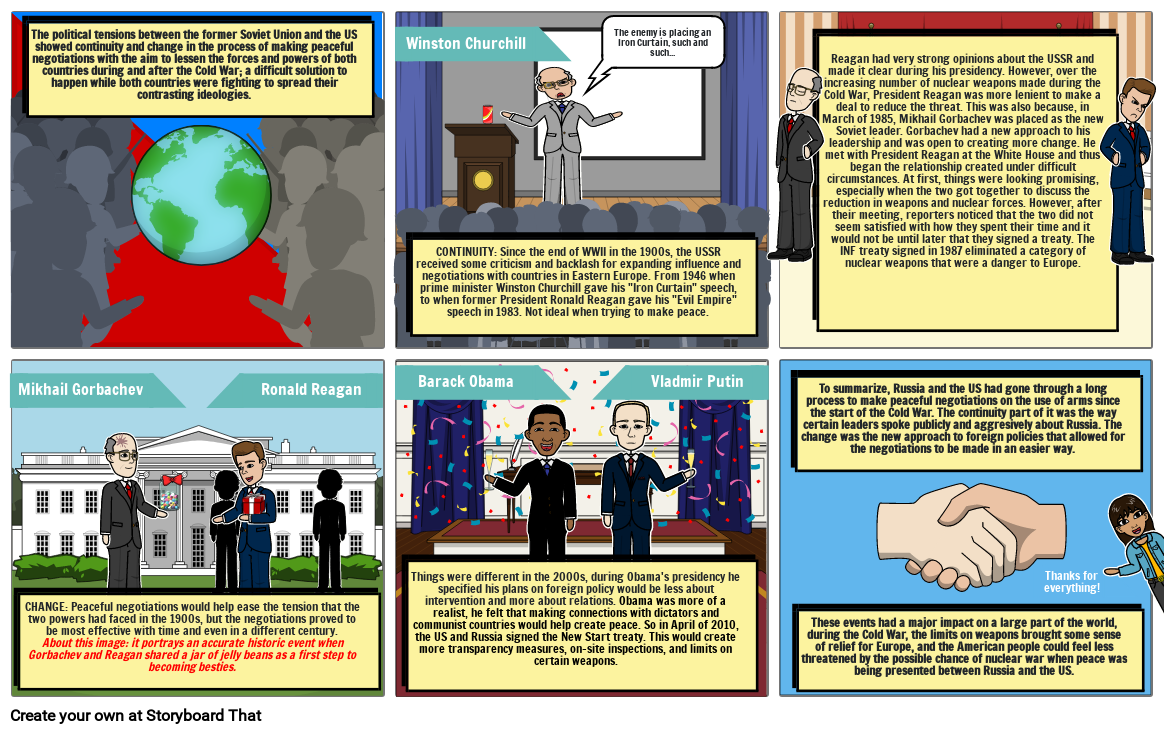USSR and The Cold war

Storyboard Text
- The political tensions between the former Soviet Union and the US showed continuity and change in the process of making peaceful negotiations with the aim to lessen the forces and powers of both countries during and after the Cold War; a difficult solution to happen while both countries were fighting to spread their contrasting ideologies.
- Winston Churchill
- CONTINUITY: Since the end of WWII in the 1900s, the USSR received some criticism and backlash for expanding influence and negotiations with countries in Eastern Europe. From 1946 when prime minister Winston Churchill gave his "Iron Curtain" speech, to when former President Ronald Reagan gave his "Evil Empire" speech in 1983. Not ideal when trying to make peace.
- The enemy is placing an Iron Curtain, such and such...
- Reagan had very strong opinions about the USSR and made it clear during his presidency. However, over the increasing number of nuclear weapons made during the Cold War, President Reagan was more lenient to make a deal to reduce the threat. This was also because, in March of 1985, Mikhail Gorbachev was placed as the new Soviet leader. Gorbachev had a new approach to his leadership and was open to creating more change. He met with President Reagan at the White House and thus began the relationship created under difficult circumstances. At first, things were looking promising, especially when the two got together to discuss the reduction in weapons and nuclear forces. However, after their meeting, reporters noticed that the two did not seem satisfied with how they spent their time and it would not be until later that they signed a treaty. The INF treaty signed in 1987 eliminated a category of nuclear weapons that were a danger to Europe.
- Mikhail Gorbachev
- CHANGE: Peaceful negotiations would help ease the tension that the two powers had faced in the 1900s, but the negotiations proved to be most effective with time and even in a different century.About this image: it portrays an accurate historic event when Gorbachev and Reagan shared a jar of jelly beans as a first step to becoming besties.
- Ronald Reagan
- Barack Obama
- Things were different in the 2000s, during Obama's presidency he specified his plans on foreign policy would be less about intervention and more about relations. Obama was more of a realist, he felt that making connections with dictators and communist countries would help create peace. So in April of 2010, the US and Russia signed the New Start treaty. This would create more transparency measures, on-site inspections, and limits on certain weapons.
- Vladmir Putin
- To summarize, Russia and the US had gone through a long process to make peaceful negotiations on the use of arms since the start of the Cold War. The continuity part of it was the way certain leaders spoke publicly and aggresively about Russia. The change was the new approach to foreign policies that allowed for the negotiations to be made in an easier way.
- These events had a major impact on a large part of the world, during the Cold War, the limits on weapons brought some sense of relief for Europe, and the American people could feel less threatened by the possible chance of nuclear war when peace was being presented between Russia and the US.
- Thanks for everything!
Over 30 Million Storyboards Created
No Downloads, No Credit Card, and No Login Needed to Try!
